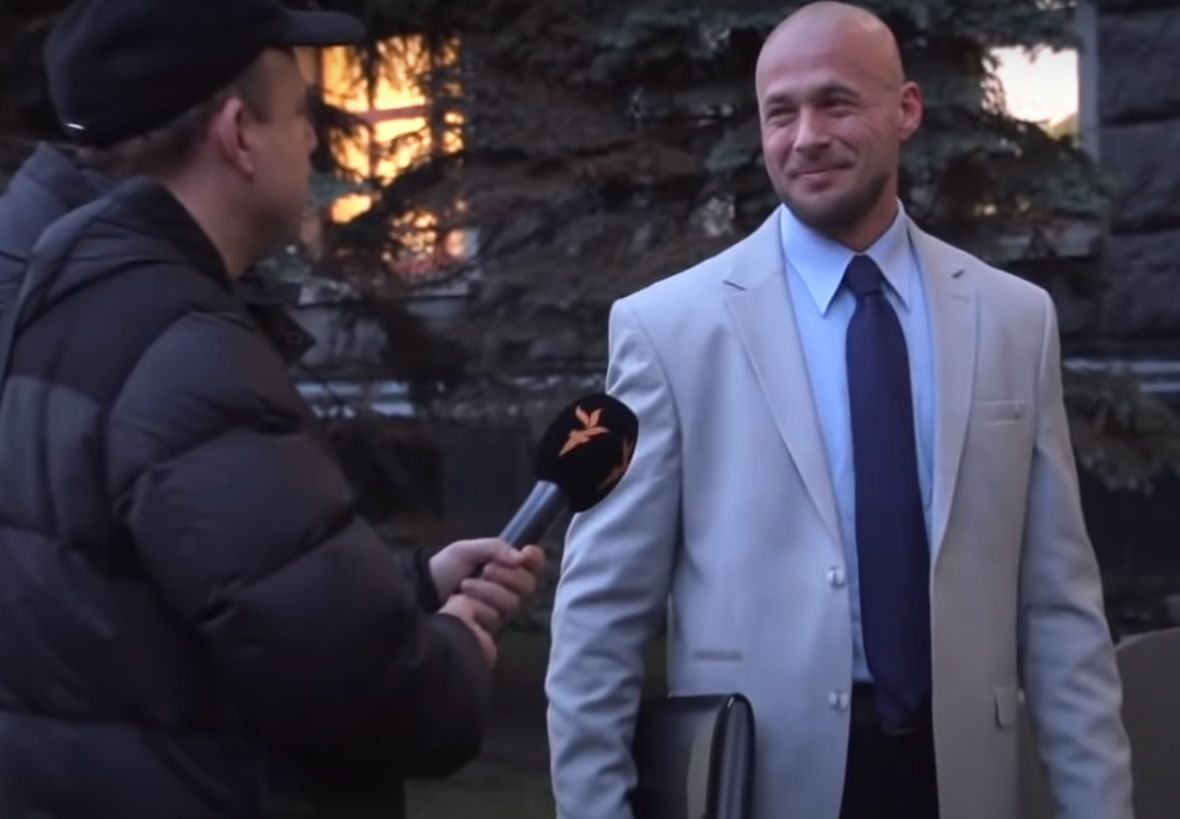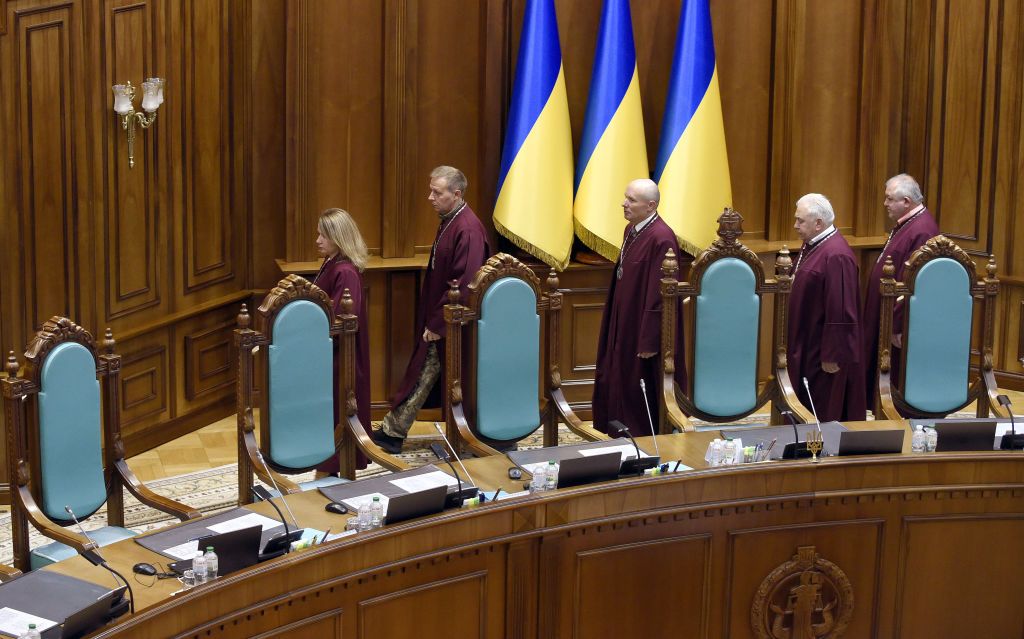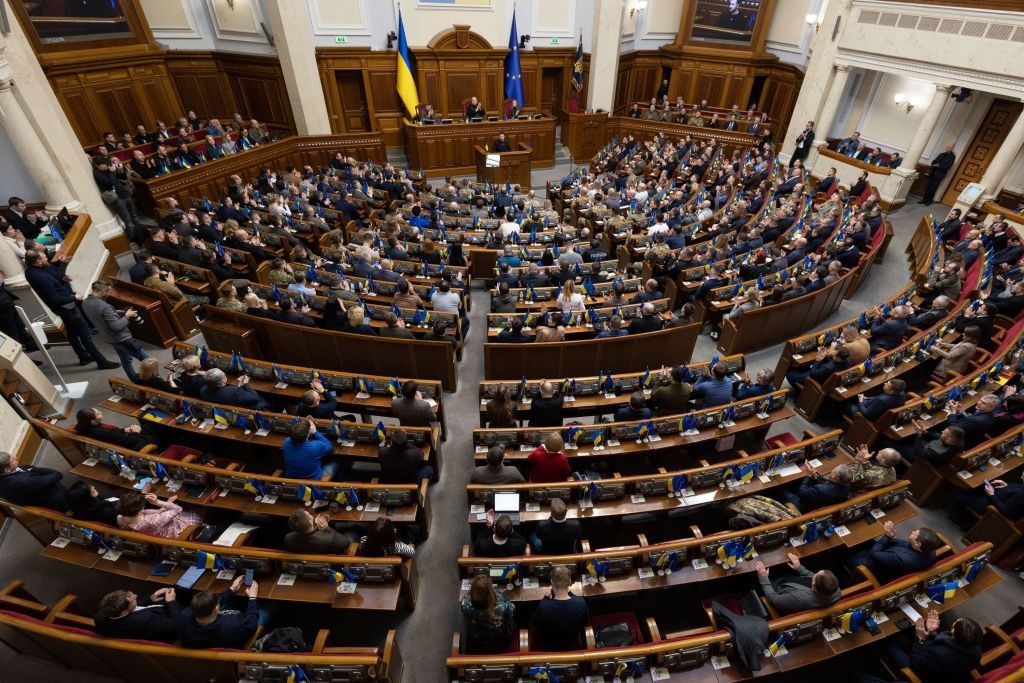Ukraine’s anti-corruption bureau makes progress yet doesn't take on top presidential allies

People walk past the offices of NABU, the National Anti-Corruption Bureau of Ukraine, on Oct. 1, 2019 in Kyiv, Ukraine. (Sean Gallup/Getty Images)
As Ukraine's civil society and the country's Western partners call on the authorities to fight corruption amid Russia's full-scale invasion, the National Anti-Corruption Bureau of Ukraine (NABU) is showing mixed results.
A year has passed since Semen Kryvonos became the head of the NABU in March 2023, replacing the bureau’s first chief Artem Sytnyk after his seven-year tenure ran out.
Under Kryvonos, the NABU has won praise from anti-corruption activists for taking on lawmakers from President Volodymyr Zelensky's party and on some of Ukraine's most influential people, including ex-Supreme Court Сhairman Vsevolod Knyazev and oligarch Ihor Kolomoisky.
However, critics question the NABU's ability and willingness to investigate top-level graft as there are no charges against some of the president's top allies facing accusations of corruption and other wrongdoing.
"There are both upsides and downsides in the NABU's performance under Kryvonos," Vadym Valko, a lawyer at the Anti-Corruption Action Center, told the Kyiv Independent, adding that some key cases are either stalled or are about to collapse.
The NABU was set up in 2015 to fight top-level corruption. It was supposed to be independent from the old discredited law enforcement system.

Nine years in, the bureau is still among the most trusted crime-fighting agencies in the country, praised by anti-corruption activists as a more independent and effective body than the rest of the pack.
With the trust, however, the bureau holds a heavy burden, since it is viewed as a benchmark for law enforcement reforms. If the NABU fails to deliver or is revealed not to be independent, it would be considered a crucial indicator that Ukraine’s effort to finally eliminate corruption has been botched.
Kryvonos wasn’t available for an interview, but he and the NABU gave written answers to the Kyiv Independent’s questions.
The NABU denied the accusations that it is influenced by top officials and argued that it is free to investigate anyone.
"I am not under any influence by any official in this state," Kryvonos told the Kyiv Independent in a written response.
Case against Supreme Court chairman
One of the landmark NABU cases under Kryvonos is the corruption investigation into former Supreme Court Chairman Vsevolod Knyazev.
In May, the NABU charged him with taking a $2.7 million bribe. Knyazev denied the accusations.
"Knyazev is a landmark figure," Valko said. "It's a strong case."
Kateryna Butko, head of anti-corruption watchdog AutoMaidan, told the Kyiv Independent that "five years ago, nobody would have believed that a Supreme Court chairman would be arrested."
Although the Knyazev case is seen as a major example of top-level corruption, critics argue that Kryvonos felt safe when going after the judge because he was not seen as a Zelensky loyalist. The NABU denied the accusations, saying it is free from political influence.
Knyazev has had a public conflict with Andriy Smyrnov, who until recently served as Zelensky's deputy chief of staff. In February 2023, he accused Smyrnov of undermining society's trust in judicial reform after Smyrnov criticized how the reform was going.
Smyrnov, in his turn, has been a subject of an illicit enrichment investigation by the NABU. Zelensky dismissed Smyrnov on March 26.
Knyazev was released from detention after paying Hr 18 million bail ($450,000) in January. The case was sent to trial in March.


The NABU said in May 2023 that several other Supreme Court judges had also taken bribes. The numbers and series of the banknotes owned by these judges coincided with those received by Knyaziev as a bribe.
However, other judges were eventually not charged, prompting speculation that law enforcement agencies were covering up for them.
“If there is evidence (against the judges) and it has been hidden, then it’s a big problem,” Valko told the Kyiv Independent.
Law enforcement sources told the Kyiv Independent that the investigators did not have enough evidence against the judges to bring charges.
But Vitaly Tytych, ex-head of civic watchdog Public Integrity Council, said that the NABU had all the resources at its disposal to prove the judges' alleged guilt through wiretapping and collecting other evidence. Tytych is a criminal defense attorney who has been involved in efforts to investigate crimes against protesters during the 2013-2014 EuroMaidan Revolution.
"If they're unable to do it, their competence can be questioned," he said.
Controversial plea deals
The Knyazev case involves a controversial practice that has faced harsh criticism – plea bargains on lenient terms.
In October, a court approved a plea bargain that the NABU and anti-corruption prosecutors had concluded with Oleh Horetsky, an intermediary in the Knyazev bribery case. He got a 5-year suspended sentence in exchange for testifying and donating Hr 29 million ($770,000) to the Armed Forces.
Law enforcement sources told the Kyiv Independent that Horetsky gave valuable testimony on Knyazev.
Another plea deal – with ex-President Viktor Yanukovych's former Ecology and Natural Resources Minister Mykola Zlochevsky – is even more controversial.
In 2020, Zlochevsky was charged with bribery after attempting to give the NABU a $6 million bribe in exchange for closing an embezzlement case against him.
In July 2023, Zlochevsky signed a plea bargain with anti-corruption prosecutors and got away without a real or suspended prison term. According to the deal, he paid a Hr 68,000 ($1,796) fine and donated Hr 661 million ($17 million) to the Armed Forces.
The details of the plea bargain were made secret for unknown reasons. Its text was leaked online by Ukrainska Pravda in October.
Several of Zlochevsky's accomplices also concluded plea deals, paying money and getting suspended terms.

The plea bargains were lambasted by several experts, including legal scholar Volodymyr Petrakovsky and Sergii Gorbatuk, a former top investigator at the Prosecutor General's Office.
Gorbatuk and a top law enforcement source familiar with the investigation, agreeing to provide information on conditions of anonymity, characterized the plea deals as unjust and a way of avoiding punishment.
Gorbatuk said such deals should stipulate shorter prison terms in exchange for substantial testimony. But if the suspects get no jail time at all, such deals effectively encourage further crimes, he added.
Law enforcement sources told the Kyiv Independent that it would have been difficult to convict Zlochevsky without a plea deal because he is abroad, and it would have been "impossible" to extradite him due to his Cypriot citizenship. The sources also said that the evidence would not be sufficient to convict him without a plea bargain.
They said that some of the plea bargains were made secret to avoid harming the interests of the investigation.
Case against oligarch Ihor Kolomoisky
Another achievement of the NABU under Kryvonos is the charges against one of Ukraine's most influential oligarchs, Ihor Kolomoisky.
Zelensky’s company produced shows for Kolomoisky’s media conglomerate for years. The oligarch’s TV channel, one of the biggest in Ukraine, helped Zelensky’s presidential campaign in 2019. However, since then they have fallen out, and Zelensky stripped Kolomoisky of his Ukrainian citizenship in 2022.
In September, Kolomoisky and his alleged accomplices were charged with embezzling $250 million from PrivatBank, the country's largest bank, which was owned by the oligarch before 2016.
"The fact that they issued charges for the most influential oligarch is an upside," Butko said.

Meanwhile, Tytych argued that the charges themselves are not an achievement and that the case can only be properly assessed when there is a court verdict.
Moreover, the Kolomoisky case may be closed soon, according to Valko.
The High Anti-Corruption Court's appeal chamber ruled in November that the NABU had missed the deadline for completing the investigation in the Kolomoisky case. The court also rejected motions to freeze the suspects' assets and to impose bail and travel restrictions on the suspects.
Kolomoisky is now awaiting trial in custody.

Defense corruption
Yet, not all cases have reached their logical conclusion – charges and trials.
The NABU said in January 2023 that it had begun investigating possible corruption in the Defense Ministry before journalists revealed large-scale theft in the ministry's food procurement.
According to an investigation by the ZN news outlet, the ministry sought to buy food at prices two to three times higher than it would cost to buy the same products in Kyiv's grocery stores.
Following a second similar story, alleging corruption in a different procurement deal, Defense Minister Oleksiy Reznikov resigned in September.
However, no charges have been brought so far.
"Publicly, there is no progress in the Defense Ministry case," Valko said. "During war, such high-profile cases must be given a priority. Nine months could be a bit too much."
But Yury Nikolov, the investigative journalist behind both stories that revealed corruption in the Defense Ministry, told the Kyiv Independent that he did not expect the investigation to move forward quickly because it was a “complicated” case of white-collar crime.
Law enforcement sources told the Kyiv Independent that forensic assessments in the Defense Ministry case would take much time.

Cases against Zelensky’s allies – and absence thereof
Both Valko and Butko praised the NABU for charging members of parliament from Zelensky's Servant of the People party in corruption cases during Kryvonos' tenure.
These include lawmakers Liudmyla Marchenko, Anatoly Hunko, and Andriy Odarchenko.
However, one of the indicators of the NABU’s success is its ability and willingness to investigate alleged corruption among top presidential allies, in contrast with low-ranking MPs.
One of the problems is that the NABU lacks jurisdiction in some cases involving the President’s Office but critics say it may also be due to the bureau’s lack of political will, since the jurisdiction limitations can be worked around sometimes.
A group of independent foreign experts said in their assessment of the NABU in October 2023 that "there were few cases against Category A officials, ministers, deputy ministers, prosecutors, and law enforcement officials." They also said that "there were no charges against top officials of the President's Office."
Before Kryvonos took the reins, there had been charges against top presidential allies such as Zelensky's deputy chief of staff, Oleh Tatarov, as well as ex-President Petro Poroshenko's top associates, including Roman Nasirov, Oleh Hladkovsky, and Mykola Martynenko. The cases are currently being considered by Ukrainian courts.
Mark Savchuk, head of the NABU's civic oversight council, and Nikolov, an investigative journalist focusing on top-level corruption, said that alleged corruption at the President's Office is not being properly investigated.
"I don't have the impression that they are going out of their way to investigate corruption at the President's Office," Nikolov said.
Oleksandr Lemenov, head of anti-corruption watchdog StateWatch, said he "doesn't see a systematic struggle against top-level corruption," in contrast with petty corruption.
Kryvonos denied the accusations that the NABU is turning a blind eye to Zelensky's top allies.
"It doesn't matter for our institution to whose entourage a specific person belongs, nor does their political affiliation or social status,” Kryvonos told the Kyiv Independent in a written statement. “In its activities, the NABU is completely apolitical and is not used in the interests of any party, group or person."
The issue has come to the forefront because there have been both journalist investigations and criminal cases involving top officials of the President's Office.
Meanwhile, some of public asset declarations, filed by top officials and members of the President’s Office, have raised eyebrows, with large amounts of money both in cash and in bank accounts being disclosed. The declarations were brought back recently after being on halt for two years, under the pretext of security risks due to the war.
Analysts see the NABU's ability to investigate the President's Office as a key indicator of independence, due to the power that the office holds.
"The president and the President's Office have accumulated in their hands immense power and control over the parliament and the government," the foreign experts said in their 2023 assessment of the NABU’s work.
Nikolov, who has been writing about corruption in Ukraine for more than a decade, agreed with this opinion.
"Now the government and parliament are nobodies, and all major decisions are made in the President's Office," he said.
Alleged evidence of wrongdoing
Savchuk told the Kyiv Independent that it is hard to investigate the President's Office itself due to legislative hurdles and secrecy. However, he said that alleged middlemen of the office have been investigated in several corruption cases.
Nikolov said that one of these alleged middlemen for the President's Office is Yuriy Holyk, who denied the accusations of wrongdoing.
Holyk has overseen an alleged corruption scheme in the government's major construction projects, and his firm has obtained huge revenue from them, according to an investigation by the Bihus.info investigative journalism project published in October.
He regularly visited the President's Office in August, Bihus.info reported.
The NABU has investigated Holyk, but no charges have been brought so far. Holyk denied the accusations of wrongdoing.
Another Zelensky ally, his deputy chief of staff Rostyslav Shurma, is also under scrutiny.
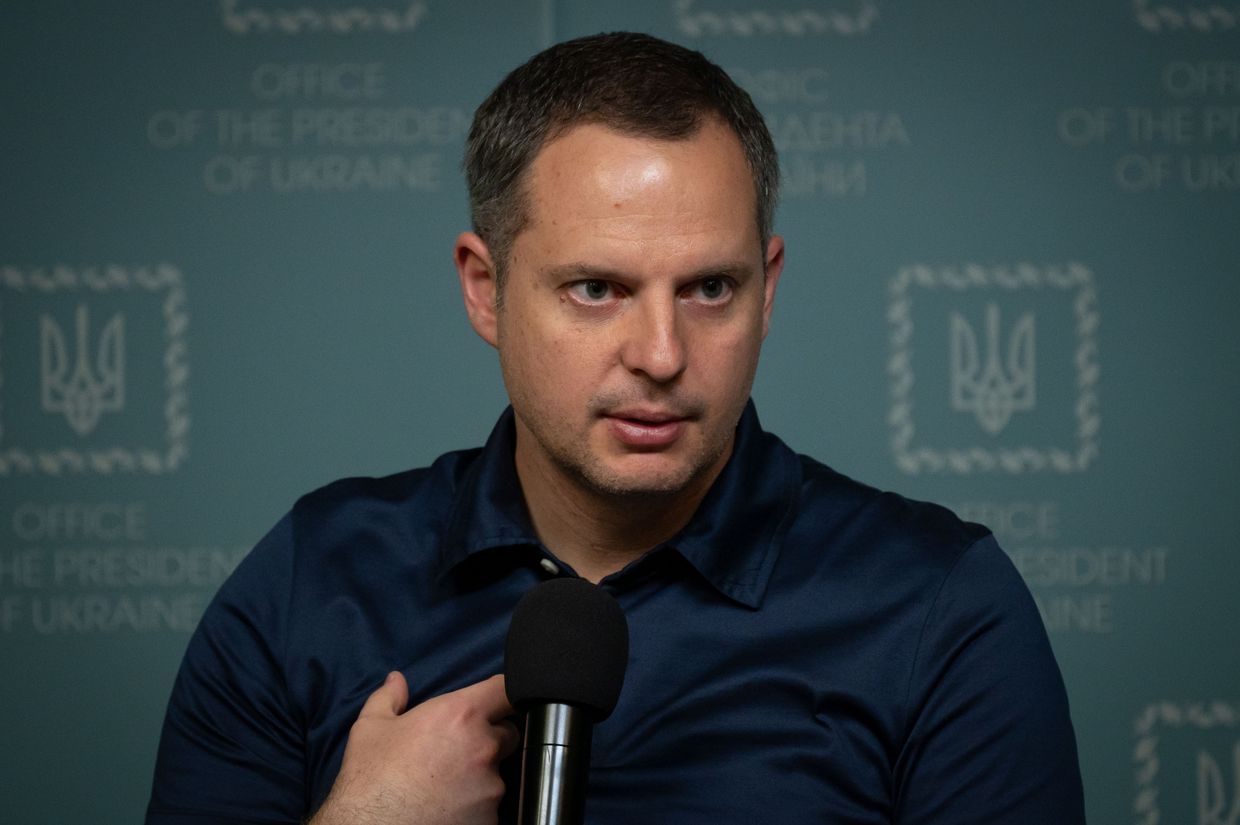
In September, Shurma confirmed that his brother's company had received money from the Ukrainian government for solar plants in Russian-occupied territories as part of renewable energy subsidies during the full-scale invasion. He denied the accusations of wrongdoing.
In the same month, the NABU opened an embezzlement case into the scheme in the wake of an investigation by Bihus.info about the solar plants. However, no charges have been brought so far.
In March 2023, the NABU also opened an illicit enrichment case against Zelensky's deputy chief of staff, Andriy Smyrnov, after Ukrainska Pravda published an investigation on the issue.
According to the publication, Smyrnov's brother had acquired considerable assets at below-market prices during the invasion, which he seemingly couldn’t afford with his known income.
No charges have been filed in the case, so far. Smyrnov denied the accusations of wrongdoing.


Another presidential staffer, Zelensky's deputy chief of staff Oleh Tatarov, was charged in 2020 with giving a bribe to an official before he joined the President’s Office. The Prosecutor General's Office and courts obstructed the case, and it was eventually closed in 2022.
"I was shocked by the unprecedented pressure in the Tatarov case," a law enforcement source familiar with the investigation told the Kyiv Independent.
Gorbatuk, a former top investigator at the Prosecutor General's Office, believes the NABU failed to take all necessary measures to counter the destruction of the Tatarov case. The case was closed under Kryvonos’ predecessor Artem Sytnyk and the bureau hasn’t tried to revive it.
Gorbatuk argued that the closure of the case must have been appealed, and the NABU and Specialized Anti-Corruption Prosecutor's Office must have filed reports on illegal interference in the case. Gorbatuk himself filed such reports on alleged illegal interference by former Prosecutor General Yury Lutsenko in 2016-2019.
Obstacles for investigating big fish
One of the problems is that officials from the President's Office are not within the NABU's jurisdiction and must be investigated by the State Investigation Bureau under Ukrainian law.
There are still legal loopholes allowing the NABU to investigate officials of the President's Office – for example, when the amount of a bribe or losses exceeds Hr 3.6 million ($95,000). The bureau can also investigate presidential staffers if a case in which they are implicated involves other top officials within the NABU's jurisdiction.
Another problem is that the NABU cannot independently wiretap the phones of presidential staffers and has to ask the Security Service of Ukraine (SBU) to wiretap them.
According to anti-corruption activists, the SBU, being controlled by the President’s Office, can obstruct such wiretapping or leak information. The head of the SBU is appointed by parliament at the president's request.
The only legal loophole is that the NABU can install covert listening devices independently, although their purchases must also be approved by the SBU.
"It's very convenient for them because (the President's Office) enjoys de facto immunity," Savchuk said. "Even if an investigation begins, the system is able to bury any case. (The President's Office) has created a fortress and built a moat around it."
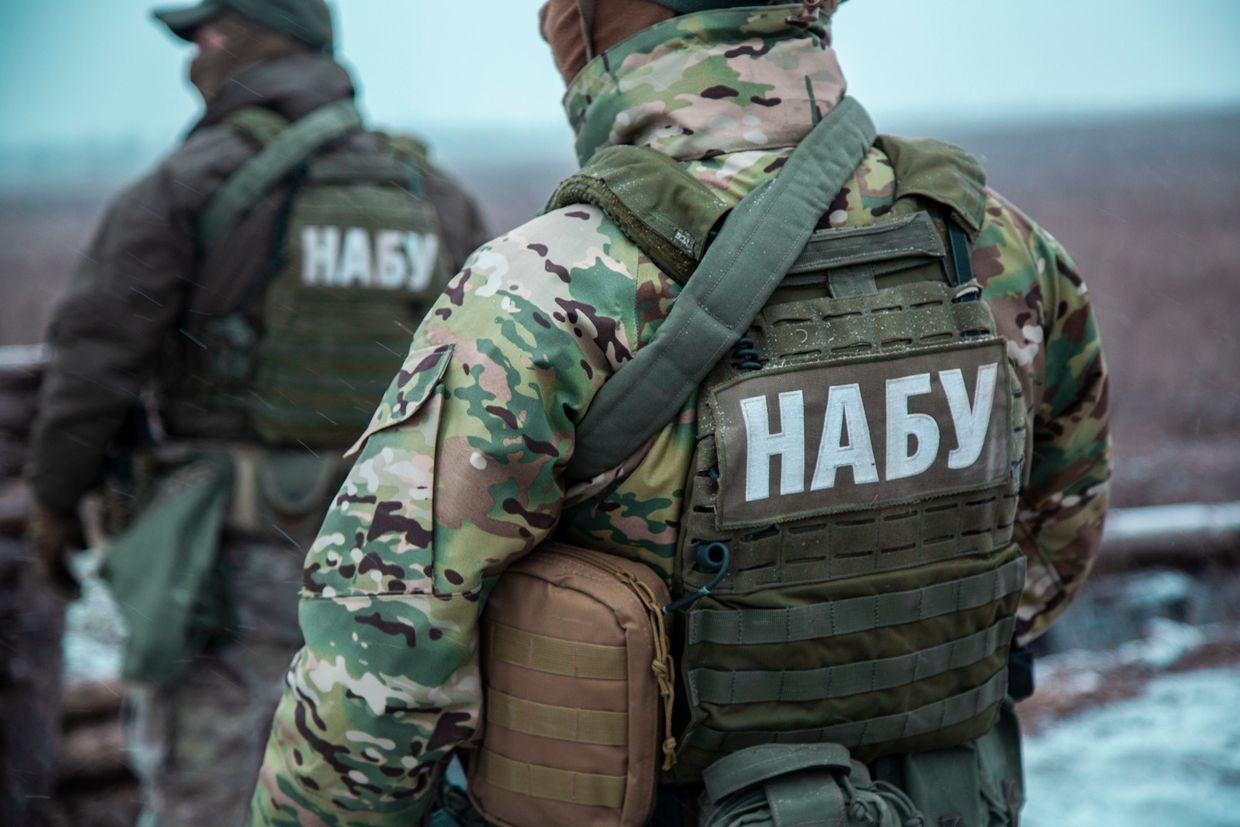
The foreign experts who carried out the 2023 assessment of the NABU called for removing legal restrictions on the NABU's ability to investigate officials of the President's Office.
Two law enforcement sources and Savchuk told the Kyiv Independent that there are currently leaks from the NABU that jeopardize corruption cases since suspects are tipped off.
The NABU denied the existence of frequent leaks but admitted that a lack of independent wiretapping powers and an independent forensic expert institution creates the risk of leaks.
Another challenge: staffing
Another challenge for the bureau is that many NABU employees have quit the bureau since Kryvonos was appointed.
The NABU told the Kyiv Independent that 65 NABU employees, including 23 detectives, had resigned or been fired from May through December 2023. The reasons for the resignations and dismissals included retirement, employees' initiative, appointment to other agencies, and disciplinary violations.
The NABU currently has around 700 employees, including more than 200 detectives, and the number of employees is expected to increase to 1,000 under a law passed in 2023.
A law enforcement source told the Kyiv Independent that the exit of NABU employees during Kryvonos' tenure had been the biggest in the bureau's history. The source argued that the main reason for their resignations was a lack of motivation.
The NABU denied this allegation in a comment for the Kyiv Independent.
Another law enforcement source told the Kyiv Independent that the psychological atmosphere at the NABU was bad in early 2023 due to worries about the bureau's new leadership and internal probes against several employees.
The probes were completed, and Kryvonos did not punish any of the employees. The corporate atmosphere improved in the second half of 2023, the source said.

In September, Andriy Kaluzhynsky, head of the NABU's main investigative department, left the NABU and was mobilized as a conscript, although he was not formally dismissed.
A law enforcement source told the Kyiv Independent that Kryvonos told NABU employees that he did not wish to see Kaluzhynsky on his team after several conflicts over work issues.
Olena Krolovetska, head of the detectives unit, resigned in May 2023.
Law enforcement sources told the Kyiv Independent that Krolovetska quit due to "personal reasons," and Kryvonos asked her to stay.
One of the sources said that Krolovetska wanted to launch a career in another sphere.
Valko and Butko said the resignations were worrying and might negatively impact the NABU's institutional capacity. Despite even the best intentions, experts say that the NABU may not have enough detectives to carry out the desperately needed investigations.

